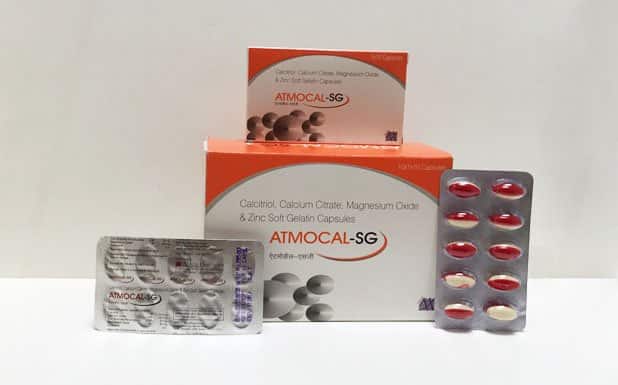
Composition
- Each Capsule Contains:
- Calcitriol BP
0.25 mcg
- Calcium Citrate USP
425 mg
- Zinc Sulphate Monohydrate USP
20 mg
- Magnesium Oxide IP
40 mg
Packing
- 10X1X10
Blister
MRP
- 125
Overview
ATMOCAL-SG Capsule works by neutralizing acids thus relieving acid reflux; regulating the intestinal fluid transport, mucosal integrity, immunity, gene expression and oxidative stress; stimulating the intestinal calcium absorption in patients with bone diseases. It can also be used in diarrhea to control bowel moment. It also prevents indigestion and relieves heartburn.
Indications:
- It is used balance blood calcium levels
- Heartburn
- Indigestion
- Immunity enhancer
- Diarrhea
- Bone weakness
- Refractory rickets
Pharmacology
Calcitriol:
Calcitriol is an active metabolite of vitamin D. Calcitriol plays an essential role in regulating plasma calcium in concert with parathyroid hormone (PTH) by increasing absorption of dietary calcium through and phosphate from the gastrointestinal tract, preventing renal tubular secretion of calcium in the kidneys, and stimulating the release of calcium stores from the skeletal system. In addition toCalcitriol promoting fatty acid synthesis and inhibiting lipolysis, calcitriol has been demonstrated to increase energy efficiency by suppressing UCP2 expression, which is modulated by signaling pathways of classical nuclear receptors, where calcitriol acts as a natural ligand. When given orally or intravenously, calcitriol is mainly used as a medication in the treatment of secondary hyperparathyroidism and resultant metabolic bone disease, hypocalcemia in patients undergoing chronic renal dialysis, and osteoporosis.Absorption:
- Calcitriol is rapidly absorbed from the intestines
- Peak plasma concentrations were reached within 3 to 6 hours
- Oral bioavailability was 70.6±5.8%
- When administered IV
- 0.49±0.14 L/kg in healthy male volunteers
- Calcitriol is approximately 99.9% bound in blood
Excretion: (approximately)
- 27% in the feces
- 7% urine respectively, within 24 hours
- Half-life was 5-8 hours
Calcium Citrate:
Increases plasma calcium levels leading to increase in calcium deposition into bone. Calcium affects parathyroid cells by stimulating a G-protein coupled calcium receptor present on the surface. The reduction in calcium excretion increases the amount of calcium deposited in bone resulting in an increase in bone mineral density.Absorption: Absorption varies inversely with intake.
T max of about 3.5-5h varying with formulation and food.
Protein binding: Calcium is 46.4% bound to plasma proteins
Elimination: Cleared via the kidneys but largely reabsorbed (98-99%) under normal conditions
Zinc Sulphate Monohydrate:
This medication is a mineral used to treat or prevent low levels of zinc alone and together with oral rehydration therapy.Zinc is required for over 70 different enzymes synthesis, including alkaline phosphatase, lactic dehydrogenase and both RNA and DNA polymerase (required in DNA and RNA formation). Zinc fastens wound healing, maintain normal growth rates, balance skin hydration and the senses of taste and smell. Zinc inhibits cAMP-induced, chloride-dependent fluid secretion by inhibiting basolateral potassium (K) channels, in in-vitro studies with rat ileum. Zinc is more specific to cAMP-activated K channels, because zinc did not block the calcium (Ca)-mediated K channels. Zinc also enhances the absorption of water and electrolytes, improves regeneration of the intestinal epithelium, increases the levels of brush border enzymes, and enhances the immune response, allowing for a better clearance of the pathogens.
Absorption: 20 to 30% of dietary zinc is absorbed, mainly from the duodenum and ileum.
Volume of distribution:
- zinc is bound to protein called metallothioneins present in the intestines
- Zinc is 60% bound to albumin
- 30 to 40% bound to alpha-2 macroglobulin
- Only 1% bound to amino acids, majorly histidine and cysteine
- Primarily fecal (approximately 90%)
- Lesser extent in the urine and in perspiration.
- Half-life is 3 hours.
Magnesium Oxide:
It helps in raising stomach pH by neutralizing it, act as mild laxative and has many nonmedicinal uses. It can also be used to relieve indigestion and heartburn.Side Effects
Nausea
Upset stomach
Diarrhea
Cramping
Unusual fatigue
Increased thirst or urination
Muscle weakness
Bone pain
Confusion
Storage
- Store at room temperature.
- Protect from light.
- Store in a dry place
- Keep out of the reach of children